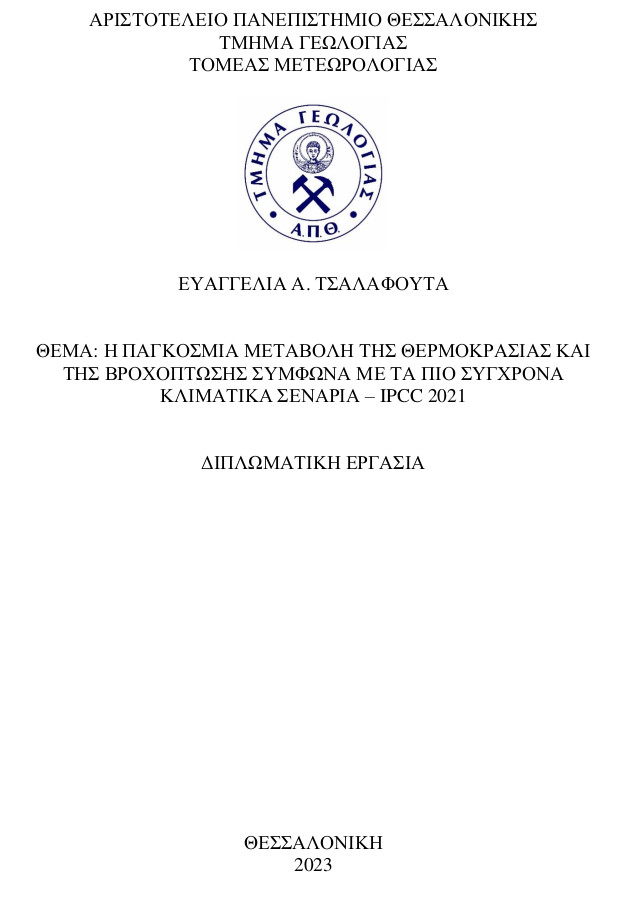
Η παγκόσμια μεταβολή της θερμοκρασίας και της βροχόπτωσης σύμφωνα με τα πιο σύγχρονα κλιματικά σενάρια - IPCC 2021 = Global temperature and precipitation change under the most modern climate scenariow - IPCC 2021.
Περίληψη
The climate is constantly changing, and as it changes, it affects ecosystems more and more. This diploma thesis aims to analyze the results on global temperature and precipitation change, according to the most recent ipcc climate scenarios. The variables of temperature (Maximum temperature, number of days with maximum temperature above 35οC, number of days with maximum temperature above 40οC, absolute maximum daily temperature, minimum temperature, frost days, absolute minimum daily temperature, average temperature, temperature at sea level) and precipitation (Total rainfall, consecutive days of drought, maximum daily rainfall, maximum daily rainfall of 5 days, drought index, snowfall) are compared with historical CMIP6 data from the 1981-2010 model, ERA5 data and CMIP6 data from the Projections model for two time periods, one medium (2041-2060) and one long-term (2081-2100). The results obtained from comparisons of data in these periods constitute the climate scenarios, whose change is analyzed for each indicator separately. Thus, for each variable – indicator the value of the change is presented for historical data, for the present and for future estimates according to each scenario.
Πλήρες Κείμενο:
PDFΑναφορές
Hylke E. Beck, Niklaus E. Zimmermann, Tim R. McVicar, Noemi Vergopolan, Alexis Berg & Eric F. Wood, Present and future Köppen-Geiger climate classification maps at 1-km resolution, Scientific Data, Article number: 180214 (2018)
Köppen, W. (1936) : Das geographisca System der Klimate, in: Handbuch der Klimatologie, edited by: Koppen, W. and Geiger, G., 1. C. ¨Gebr, Borntraeger, 1–44, 1936
Peel, M. C., Finlayson, B. L. & McMahon, T. A. Updated world map of the Köppen-Geiger climate classification. Hydrology and Earth System Sciences 11, 1633–1644 (2007).
National Academy of Sciences. (2020). Climate change: Evidence and causes: Update 2020. The National Academies Press, Washington, DC, p. 5. doi: 10.17226/25733
Bindoff, N. L., P. A. Stott, K. M. AchutaRao, M. R. Allen, N. Gillett, D. Gutzler, K. Hansingo, G. Hegerl, Y. Hu, S. Jain, I. I. Mokhov, J. Overland, J. Perlwitz,
R. Sebbari, and X. Zhang, 2013: Detection and attribution of climate change: From global to regional. Climate Change 2013: The Physical Science Basis. Contribution of Working Group I to the Fifth Assessment Report of the Intergovernmental Panel on Climate Change. Stocker, T. F., D. Qin, G.-K. Plattner, M. Tignor, S. K. Allen, J. Boschung, A. Nauels, Y. Xia, V. Bex, and P. M. Midgley, Eds., Cambridge University Press, Cambridge, United Kingdom and New York, NY, USA, 867–952.
G. Myhre, D. Shindell, F.-M. Bréon, W. Collins, J. Fuglestvedt, J. Huang, D. Koch, J.-F. Lamarque, D. Lee, B. Mendoza, T. Nakajima, A. Robock, G. Stephens, T. Takemura, and H. Zhang, 2013: Anthropogenic and natural radiative forcing. Climate Change 2013: The Physical Science Basis. Contribution of Working Group I to the Fifth Assessment Report of the Intergovernmental Panel on Climate Change. Stocker, T. F., D. Qin, G.-K. Plattner, M. Tignor, S. K. Allen, J. Boschung, A. Nauels, Y. Xia, V. Bex, and P. M. Midgley, Eds., Cambridge University Press, Cambridge, United Kingdom and New York, NY, USA, 659–740.
Fahey, D. W., S. Doherty, K. A. Hibbard, A. Romanou, and P. C. Taylor, 2017: Physical Drivers of Climate Change. Climate Science Special Report: Fourth National Climate Assessment, Volume I. Wuebbles, D. J., D. W. Fahey, K. A. Hibbard, D. J. Dokken, B. C. Stewart, and T. K. Maycock, Eds., U.S. Global Change Research Program, Washington, DC, USA, 73–113. doi:10.7930/J0513WCR.
Wuebbles, D. J., D. R. Easterling, K. Hayhoe, T. Knutson, R. E. Kopp, J. P. Kossin, K. E. Kunkel, A. N. LeGrande, C. Mears, W. V. Sweet, P. C. Taylor, R. S. Vose, and M. F. Wehner, 2017: Our Globally Changing Climate. Climate Science Special Report: Fourth National Climate Assessment, Volume I. Wuebbles, D. J., D. W. Fahey, K. A. Hibbard, D. J. Dokken, B. C. Stewart, and T. K. Maycock, Eds., U.S. Global Change Research Program, Washington, DC, USA, 35–72. doi:10.7930/J08S4N35.
About the IPCC, overview_, https://www.ipcc.ch/about/
ipcc reports, special and methology reports
ipcc reports, sixth assessment report
Van Vuuren et al., 2011: The representative concentration pathways: an overview, Climatic Change volume 109, Article number: 5 (2011), doi:10.1007/s10584-011-0148-z
Leggett J, Pepper W, Swart RJ (1992) Emissions Scenarios for the IPCC: an Update. In: Houghton JT, Callander BA, Varney SK (eds) Climate change 1992. The Supplementary Report to the IPCC Scientific Assessment. Cambridge University Press, Cambridge, pp 71–95
Nakicenovic et al (2000) Special Report on Emissions Scenarios (SRES). Cambridge University Press, Cambridge
Moss RH, Edmonds JA, Hibbard KA, Manning MR, Rose SK, van Vuuren DP, Carter TR, Emori S, Kainuma M, Kram T et al (2010) The next generation of scenarios for climate change research and assessment. Nature 463:747–756
O’Neill et al. 2016: The Scenario Model Intercomparison Project (ScenarioMIP) for CMIP6, Geosci. Model Dev., 9, 3461–3482, 2016, doi:10.5194/gmd-9-3461-2016
Riahi et al. 2017: The Shared Socioeconomic Pathways and their energy, land use, and greenhouse gas emissions implications: An overview, Global Environmental Change 42 (2017) 153–168, doi:10.1016/j.gloenvcha.2016.05.009
Kriegler et al., 2014: A new scenario framework for climate change research: the concept of shared climate policy assumptions, Climatic Change (2014) 122:401–414, doi:10.1007/s10584-013-0971-5
Van Vuuren et al., 2013: A new scenario framework for Climate Change Research: scenario matrix architecture, Climatic Change, volume 122, pages373–386(2014), doi:10.1007/s10584-013-0906-1
Copernicus, Climate reanalysis https://climate.copernicus.eu/climate-reanalysis
Anna Pirani, Sarah L. Connors, Clotilde Péan, Yang Chen, Climate Change 2021, The Physical Science Basis, Working Group I Contribution to the Sixth Assessment Report of the Intergovernmental Panel on Climate Change Summary of Policymakers
Εισερχόμενη Αναφορά
- Δεν υπάρχουν προς το παρόν εισερχόμενες αναφορές.
